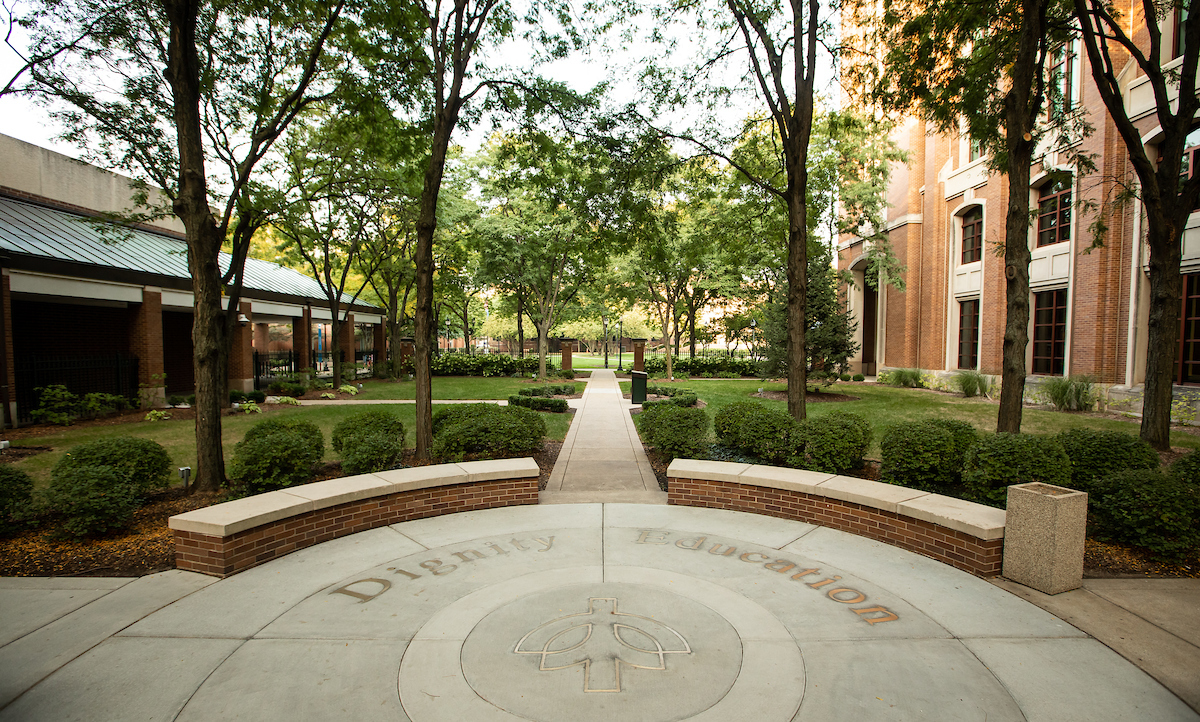 (DePaul University/Jeff Carrion)The Strategic Resource Allocation Committee has begun meeting to launch the university's budgeting process for the next two academic years.
(DePaul University/Jeff Carrion)The Strategic Resource Allocation Committee has begun meeting to launch the university's budgeting process for the next two academic years.
The goal of the committee, known as SRAC, is to propose a budget that continues to achieve the university's strategic objectives and further DePaul's pursuit of its mission. Committee members representing DePaul's faculty, staff and students will discuss broad financial decisions, such as tuition pricing and employee benefits and compensation, and will recommend a comprehensive university budget.
Typically, SRAC's work completes in the fall. The committee is working on a modified timeline from years past so that decision-making can occur with the most accurate enrollment information in hand in light of uncertainty brought on by the pandemic.
Another change is while past budgeting cycles have planned for the following fiscal year, SRAC will propose a budget to address the next two fiscal years: 2021-22 and 2022-23. Multi-year budgeting for revenues and expenses provides a framework for current financial decisions to ensure that these decisions are compatible with medium-term financial strategy and tie into long-range financial planning. Any significant changes in financial circumstances during the two-year period would be addressed as necessary by budget amendments approved by the university's Board of Trustees.
Even before the pandemic began, the university faced a widening gap between revenue and expenses and a likelihood of steeper enrollment challenges in the near future due to declining numbers of college-going students. University leadership were in the process of addressing an $11 million budget gap in spring 2020 when the pandemic hit. Those cost reductions were delayed to give the institution more flexibility during the early months of the COVID-19 crisis.
DePaul began the 2020-21 fiscal year with those financial challenges and more—some that resulted from having fewer enrolled students than in years past and some that were brought on by the pandemic.
In fall 2020, DePaul enrolled the largest freshman class in university history and new master's student enrollment remained strong. These strong new student outcomes were not enough to offset an overall decrease in continuing undergraduate students. With results through the winter term, the administration projects net tuition revenue to be approximately $22 million less than budget by the end of the fiscal year.
In addition, auxiliary revenues in the pandemic environment were lower than what had been budgeted. This includes revenue declines in housing, food service, athletics, leasing, bookstores and the Ray Meyer Fitness Center. In all, the university expects to lose approximately $50 million in auxiliary revenue due to disruptions in business associated with the pandemic.
SRAC will consider these factors when recommending a budget that continues to achieve the university's strategic objectives and further DePaul's pursuit of its mission.
In its meetings, SRAC will hear budget presentations from the Offices of Academic Affairs, the President and the Executive Vice President. The committee considers enrollment projections and tuition pricing, fees and financial aid as proposed by the tuition pricing committee. They also consider the executive areas' presentations on proposed expenses and the university's projected financial position, which includes potential benefits and compensation costs and other expenditures for the coming year.
SRAC's nine members will vote in the next month on a budget proposal to recommend to the Office of the President. The university president can approve or modify the recommendations before making a budget proposal to the board of trustees' finance committee.
The board finance committee considers the president's recommendations for approval and may send the budget as proposed or a modified set of recommendations to the general board of trustees. At its meeting in early May, the board will vote on a final budget that will take effect July 1, 2021.
SRAC members are appointed by the president, including representatives who are recommended by Staff and Faculty Council and two dean appointments who are recommended by the provost. This year's voting members of SRAC are:
- Salma Ghanem, interim provost (committee co-chair)
- Sherri Sidler, vice president for finance and interim executive vice president (committee co-chair)
- Alyssa Isoberto, Student Government Association president
- Bob McCormick, vice president for Information Services
- Bamshad Mobasher, Faculty Council representative
- Scott Paeth, Faculty Council president
- Victoria Van Kirk Pride, Staff Council president
- Guillermo Vásquez de Velasco, dean of the College of Liberal Arts and Social Sciences
- Paul Zionts, dean of the College of Education